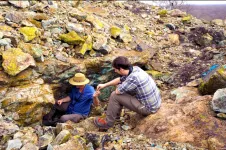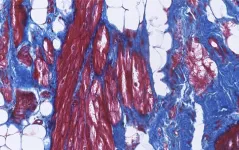EMBARGOED FOR RELEASE UNTIL 4 P.M. ET, WEDNESDAY, MARCH 22, 2023
MINNEAPOLIS – People who have low bone density may have an increased risk of developing dementia compared to people who have higher bone density, according to a study published in the March 22, 2023, online issue of Neurology®, the medical journal of the American Academy of Neurology. The study does not prove that low bone density causes dementia. It only shows an association.
“Low bone density and dementia are two conditions that commonly affect older people simultaneously, especially as bone loss often increases due to physical inactivity and poor nutrition during dementia,” said study author Mohammad Arfan Ikram, MD, PhD, of the Erasmus University Medical Center in Rotterdam, Netherlands. “However, little is known about bone loss that occurs in the period leading up to dementia. Our study found that bone loss indeed already occurs before dementia and thus is linked to a higher risk of dementia.”
The study involved 3,651 people in the Netherlands with an average age of 72 who did not have dementia at the start of the study.
Over an average of 11 years, 688 people or 19% developed dementia.
Researchers looked at X-rays to identify bone density. Participants were interviewed every four to five years and completed physical tests such as bone scans and tests for dementia.
Of the 1,211 people with the lowest total body bone density, 90 people developed dementia within 10 years, compared to 57 of the 1,211 people with the highest bone density.
After adjusting for factors such as age, sex, education, other illnesses and medication use, and a family history of dementia, researchers found that within 10 years, people with the lowest total body bone density were 42% more likely to develop dementia than people in the highest group.
“Previous research has found factors like diet and exercise may impact bones differently as well as the risk of dementia,” Ikram added. “Our research has found a link between bone loss and dementia, but further studies are needed to better understand this connection between bone density and memory loss. It’s possible that bone loss may occur already in the earliest phases of dementia, years before any clinical symptoms manifest themselves. If that were the case, bone loss could be an indicator of risk for dementia and people with bone loss could be targeted for screening and improved care.”
A limitation of the study is that participants were primarily of European origin and age 70 or older at the start of the study, so these findings may vary in different races, ethnicities, and younger age groups.
The study was funded by Erasmus Medical Center and Erasmus University Rotterdam, The Netherlands Organization for Scientific Research, The Netherlands Organization for Health Research and Development, the Research Institute for Diseases in the Elderly, The Netherlands Genomics Initiative, the Ministry of Education, Culture and Science, the Ministry of Health, Welfare and Sports, the European Commission and the Municipality of Rotterdam.
Learn more about dementia at BrainandLife.org, home of the American Academy of Neurology’s free patient and caregiver magazine focused on the intersection of neurologic disease and brain health. Follow Brain & Life® on Facebook, Twitter and Instagram.
When posting to social media channels about this research, we encourage you to use the hashtags #Neurology and #AANscience.
The American Academy of Neurology is the world’s largest association of neurologists and neuroscience professionals, with over 40,000 members. The AAN is dedicated to promoting the highest quality patient-centered neurologic care. A neurologist is a doctor with specialized training in diagnosing, treating and managing disorders of the brain and nervous system such as Alzheimer’s disease, stroke, migraine, multiple sclerosis, concussion, Parkinson’s disease and epilepsy.
For more information about the American Academy of Neurology, visit AAN.com or find us on Facebook, Twitter, Instagram, LinkedIn and YouTube.
END
Is bone health linked to brain health?
2023-03-22
(Press-News.org)
ELSE PRESS RELEASES FROM THIS DATE:
In epilepsy, higher risk of early death varies based on severity, other factors
2023-03-22
EMBARGOED FOR RELEASE UNTIL 4 P.M. ET, WEDNESDAY, MARCH 22, 2023
MINNEAPOLIS – A new study has found that people with epilepsy have an increased risk of early death and the increased risk varies depending on where they live, the number of medications they take and what other diseases they may have. The study is published in the March 22, 2023, online issue of Neurology®, the medical journal of the American Academy of Neurology.
“Our research found an increased risk even among those who do not have ...
Air flow research could reduce disease, contamination spread
2023-03-22
Air flow in a room can impact the transmission of viruses like COVID-19.
A Texas A&M AgriLife Research scientist is studying how heating, ventilation and air conditioning, HVAC, system configurations and building designs could mitigate the spread of microorganisms, including viruses, that are detrimental to human health.
Maria King, Ph.D., director of the Center for Agricultural Air Quality Engineering and Science in the Department of Biological and Agricultural Engineering, recently received a $400,000, two-year National ...
Memory B cell marker predicts long-lived antibody response to flu vaccine
2023-03-22
BIRMINGHAM, Ala. – Memory B cells play a critical role to provide long-term immunity after a vaccination or infection. In a study published in the journal Immunity, researchers describe a distinct and novel subset of memory B cells that predict long-lived antibody responses to influenza vaccination in humans.
These effector memory B cells appear to be poised for a rapid serum antibody response upon secondary challenge one year later, Anoma Nellore, M.D., Fran Lund, Ph.D., and colleagues at the University of Alabama at Birmingham and Emory University report. Evidence from transcriptional and epigenetic profiling shows that the cells in this subset differ from ...
Copper artifacts unearth new cultural connections in southern Africa
2023-03-22
COLUMBIA, Mo. – Chemical and isotopic analysis of copper artifacts from southern Africa reveals new cultural connections among people living in the region between the 5th and 20th centuries according to a University of Missouri researcher and colleagues.
People in the area between northern South Africa and the Copperbelt region in central Africa were more connected to one another than scholars previously thought, said Jay Stephens, a post-doctoral fellow in the MU Research Reactor (MURR) Archaeometry Lab.
“Over the past 20 to 30 years, most archaeologists ...
Babies or beauty?
2023-03-22
Have you ever marveled at the vast diversity of life on our planet, from tiny creatures living only a few hours to majestic beings that can survive for centuries? These differences in lifespan, size, and reproductive age are known as life-history strategies, and they have evolved over time as organisms adapt to their environments.
Evolutionary biologists have long been interested in understanding the factors that contribute to the evolution and maintenance of multiple alternative life-history strategies (ALHS) within species that lead to adaptation and novel traits. A new study published in Science Advances has not only revealed that an ALHS in Colias ...
The Protein Society announces its 2023 award winners
2023-03-22
FOR IMMEDIATE RELEASE
March 22, 2023
THE PROTEIN SOCIETY ANNOUNCES ITS 2023 AWARD RECIPIENTS
LOS ANGELES, CA – The Protein Society, the premier international society dedicated to supporting protein research, announces the winners of the 2023 Protein Society Awards, which will be conferred at the 37th Anniversary Symposium, July 13 – 16, 2023, in Boston, Massachusetts. Plenary talks from select award recipients will take place throughout the 3.5-day event. The scientific accomplishments of the awardees, highlighted here as described by their nominators, demonstrate their lasting impact on protein science.
The Carl Brändén Award, sponsored by Rigaku ...
Road noise makes your blood pressure rise – literally
2023-03-22
If you live near a busy road you might feel like the constant sound of roaring engines, honking horns and wailing sirens makes your blood pressure rise. Now a new study published today in JACC: Advances confirms it can do exactly that.
Previous studies have shown a connection between noisy road traffic and increased risk of hypertension. However, strong evidence was lacking, and it was unclear whether noise or air pollution played a bigger role. The new research shows that it is exposure to road traffic noise itself that can elevate hypertension risk.
“We were a ...
Potential relief for osteoarthritis moves to clinical trial after animal studies
2023-03-22
A team of researchers at the Keck School of Medicine of USC have found a drug with the potential for curbing painful hyperinflammation from osteoarthritis, according to results of an animal study.
The findings, published March 22nd in Science Translational Medicine, indicate that a drug compound, R805/CX-011, may modulate an important cell receptor in the body’s immune system, GP130, that signals when antibodies should attack a virus or infection. The animal model studies showed that the drug compound can disrupt the receptor’s over-activation of inflammation, and still manage pain ...
Racial disparities in US drug overdose fatalities significantly higher in 2020
2023-03-22
The first year of the COVID pandemic saw significant increases in drug overdose deaths across the USA, with rates higher than recent trends could have predicted. Research published in the open access journal PLOS Global Public Health, reports trends in drug overdose deaths between 2013-20 across four major drug categories by gender, race and geography. It finds high levels of heterogeneity in overdose patterns across different demographic groups and that the gap in overdose fatalities between black and white individuals continues to widen. Drug prevention and mitigation campaigns should therefore be tailored to specific at-risk groups.
Drug overdose deaths have been ...
From mutation to arrhythmia: desmosomal protein breakdown as an underlying mechanism of cardiac disease
2023-03-22
Mutations in genes that form the desmosome are the most common cause of the cardiac disease arrhythmogenic cardiomyopathy (ACM), which affects one in 2000 to 5000 people worldwide. Researchers from the group of Eva van Rooij now discovered how a mutation in the desmosomal gene plakophilin-2 leads to ACM. They found that the structural and functional changes in ACM hearts caused by a plakophilin-2 mutation are the result of increased desmosomal protein degradation. The results of this study, published in Science Translational Medicine ...





